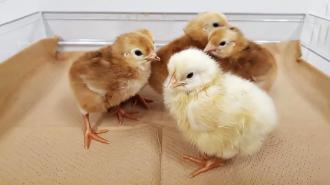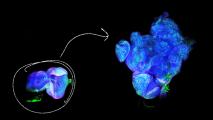A CRISPR-alternative has been used to create eggs that are unlikely to trigger allergic reactions. That’s a potentially big deal for millions of children who are allergic to eggs — not just for their diets but also for their immune systems.
The challenge: Allergic reactions are caused by the immune system mistaking something usually benign, like peanuts or pollen, for a harmful invader. Depending on the severity of the allergy, this can lead to anything from a mild rash to life-threatening anaphylaxis.
Eggs are a pretty common allergy, with up to 2% of children experiencing a reaction to them. Most kids outgrow their egg allergy by the time they’re 16 years old, but until they do, they’ll need to avoid eating eggs and the many products that contain them.
People who are allergic to eggs are also at risk of experiencing a reaction to flu vaccines, which are typically grown in eggs — although rare, the shots can trigger anaphylaxis in a person with an egg allergy.
Eggs are a pretty common allergy, with up to 2% of children experiencing a reaction to them.
What’s new? Researchers at Hiroshima University in Japan have now used gene-editing technology to create chickens that lay eggs without ovomucoid (OVM), the protein most likely to trigger an egg allergy.
“These results … reveal that the eggs laid by this OVM knockout chicken solve the allergy problem in food and vaccines,” said lead author Ryo Ezaki.
How it works: Rather than using the popular gene-editing tool CRISPR to create the OVM-free eggs, the researchers relied on a different, older technology: TALEN (transcription activator-like effector nucleases).
While CRISPR is generally simpler and cheaper than TALEN, some forms of it are also more likely to affect parts of the genome beyond the target site. Such off-target edits could lead to mutant versions of OVM that might still trigger an egg allergy, so the researchers opted for a TALEN system.
The eggs the hens laid contained no regular or mutant OVM protein.
After engineering it to target the OVM gene, the researchers injected it into chicken embryos.
While DNA sequencing of the edited hens did reveal mutations that may have been off-target effects of TALENs, they weren’t in genes (regions of DNA that code for proteins), and the eggs the hens laid contained no regular or mutant OVM protein at all, or any other “evident abnormalities.”
Looking ahead: Given that even a small amount of OVM protein could be life-threatening for someone with a severe egg allergy, the researchers plan to perform more studies before claiming that their eggs will not trigger reactions if eaten or used for vaccines.
“The next phase of research will be to evaluate the physical properties and processing suitability of OVM-knockout eggs, and to confirm their efficacy through clinical trials,” said Ezaki. “We will continue to conduct further research toward the practical application of allergy-reduced eggs.”
We’d love to hear from you! If you have a comment about this article or if you have a tip for a future Freethink story, please email us at [email protected].






